medicinal mushroom blend
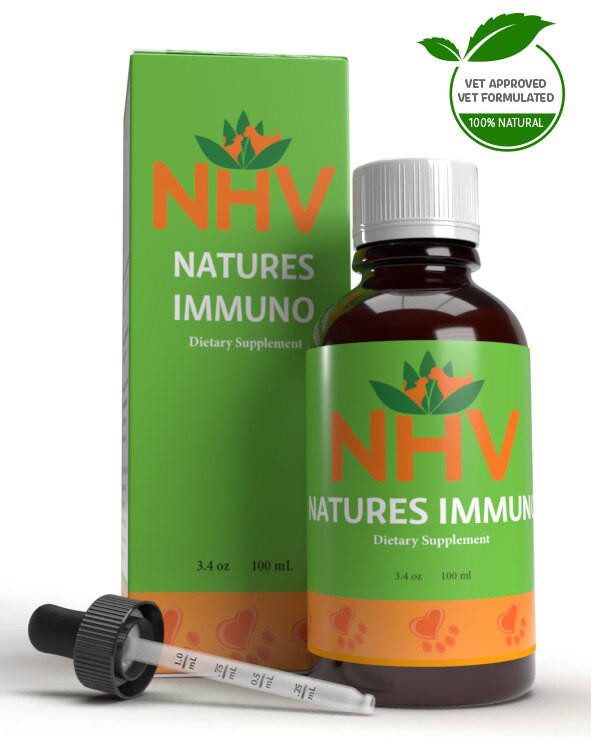
free shipping over $100 (USA & Canada)
1-877-937-4372 the pet expert hotline
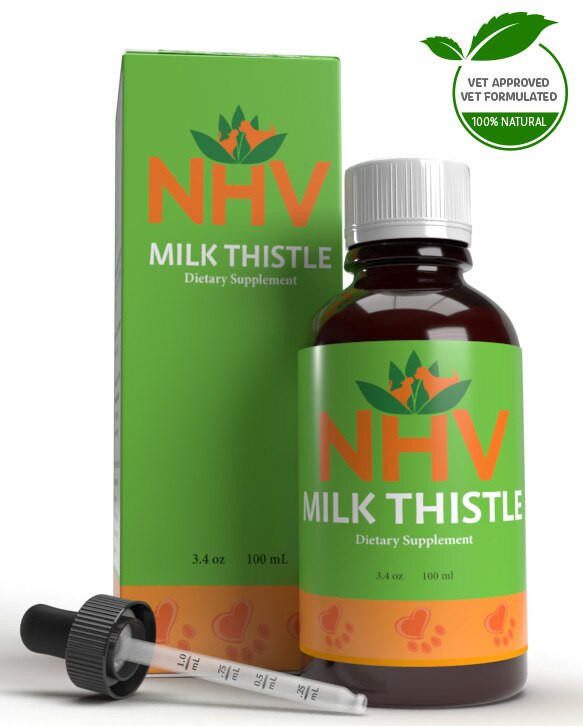
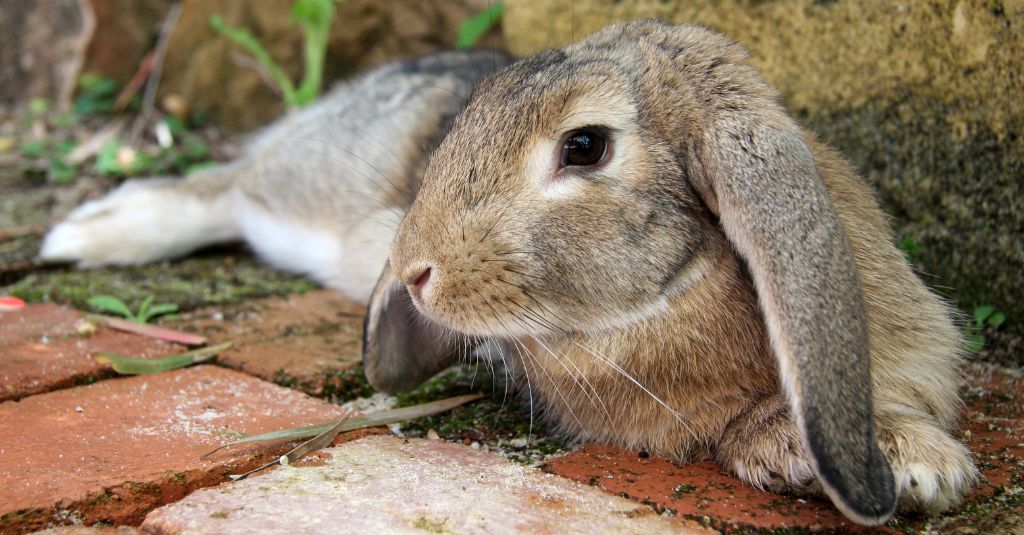
As a bunny parent, you have probably heard that the rabbit head tilt is one of the scariest symptoms of E. cuniculi. But what is this disease that infects more than 50% of rabbits worldwide after all? E. cuniculi is short for Encephalitozoon cuniculi, a primitive fungus. This fungal infection affects mainly rabbits but can occasionally happen in mice, guinea pigs, rats, and dogs.
Rabbits can get the infection from their mothers, in utero, or by ingesting the spores present in the urine of an infected bunny. So making sure your little one is examined by a veterinarian as soon as they are welcomed into your family, learning more about their health history and doing research on the most common diseases that affect rabbits are good ways to prevent problems like E. cuniculi.
With an early diagnosis, vet-prescribed treatment, natural support and extra love, a bunny with E. cuniculi can still have a good quality of life.
The rabbit head tilt is one of the clear signs that your little one might have E. cuniculi. Back leg weakness, loss of balance, tremors and paralysis can also happen from the swelling and destruction of the nervous tissue in that area. Other than affecting your rabbit’s central nervous system, E. cuniculi can also lead to kidney and eye problems.
Signs of kidney failure and bladder weakness in your little one may include increased thirst and urination, weight loss and decreased appetite. NHV Tripsy may help support and protect your bunny kidneys in these cases.
The rabbit head tilt is one of the clear signs that your little one might have E. cuniculi.
The E. cuniculi fungus can also affect the eyes of unborn rabbits as a result of in-utero infection. This may cause destruction of the lens and eye issues later in life (usually at around six months to two years of age). In these cases, NHV OcuLove can help maintain healthy eye function. Sometimes surgery in the eyes may also be required as the rabbit may develop a cloudy lens and cataracts.
Unfortunately, once the rabbit develops severe clinical signs, E. cuniculi can be fatal. So if you notice any of these signs on your bunny, you should visit a local veterinarian for a diagnosis right away.
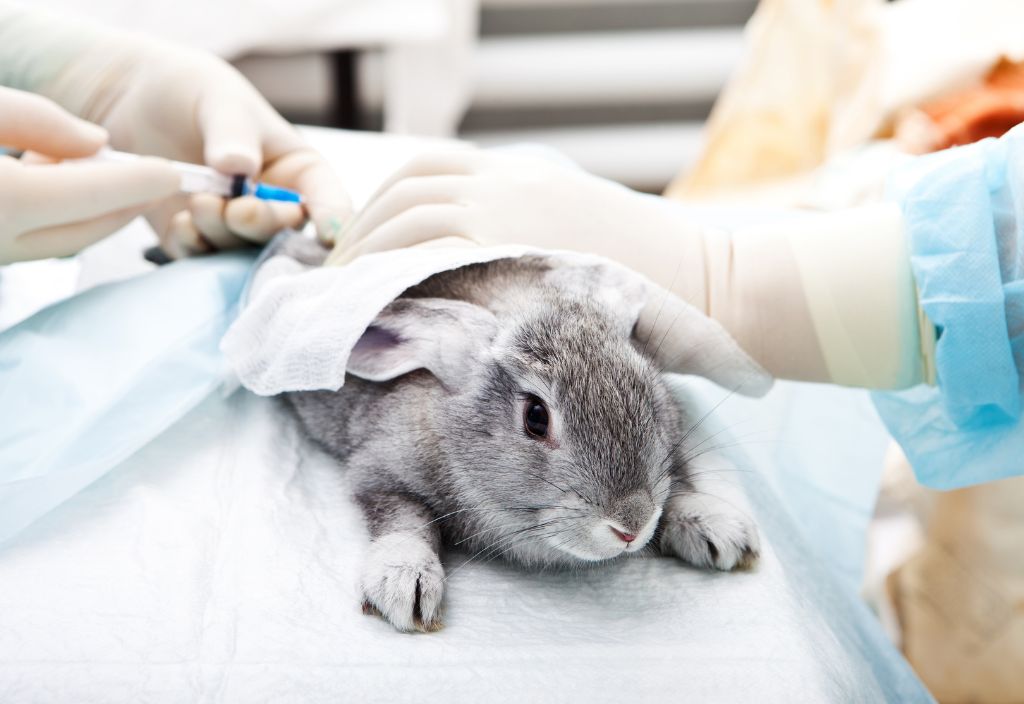
Caring for a rabbit with E. cuniculi should always start with a frank conversation with the vet. The specialist will diagnose your furkiddo based on the clinical symptoms described above, with the rabbit head tilt being the most obvious sign. Laboratory tests such as serologic testing and histopathology can help confirm the diagnosis.
Some evidence suggests that some anti-helminthic (antiparasitic) drugs may be effective, but there is still no effective treatment accepted by the veterinarian community. The use of steroids in rabbits is also controversial, but they have been used in select cases due to their inflammatory properties on the central nervous system.
That is why it is very important to talk to a specialized vet before medicating your furry friend.
Natural herbal supplements can work alongside the vet-prescribed treatment to offer extra support to a rabbit with E. cuniculi. NHV Milk Thistle, for example, may help protect the kidneys and liver against the side effects of long-term use of medication.
Yucca contains steroidal saponins that stimulate the body to produce its own natural corticosteroids.
As steroids may be used in the treatment of rabbits with E. cuniculi, NHV Yucca may also be given for extra support. Yucca contains steroidal saponins that stimulate the body to produce its own natural corticosteroids, which makes it safe for life-long use.
Seeing as rabbits affected by E. cuniculi have their immunity compromised, NHV Natures Immuno can also be really helpful. This formula contains a blend of medicinal mushrooms that help balance the immune system and support their overall health as they fight this disease.
Lastly, NHV Inulin-PK works as a natural dewormer and has anti-helminthic properties that can work well with the vet-prescribed treatment. We only ask that you respect a break of at least 30 minutes (preferably 2 hours) between any medication and our natural supplements.
Seeing your little one with the dreadful rabbit head tilt can be scary. But we are here to help your journey in caring for a bunny with E. Cuniculi. Come chat with us for more tips on how to continue to give your pet bunny the best proactive and supportive care. We are always a message away!
medicinal mushroom blend

Vet-Formulated Supplement of Medicinal Mushrooms for Dogs
buy 2 and save $3
3 month supply for a small to medium size pet
What Is It?
Natures Immuno is a natural supplement formulated for dogs from Turkey Tail, Cordyceps, Reishi, Shiitake, and Agaricus mushrooms.
How Does it Work?
Why Should I Trust It?
Formulated by a holistic veterinarian and master herbalist.

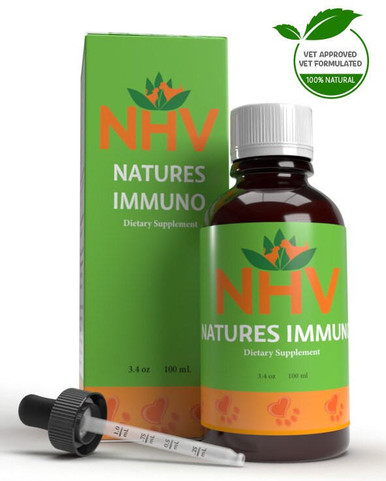
What Is It?
Natures Immuno is a natural supplement formulated for dogs from Turkey Tail, Cordyceps, Reishi, Shiitake, and Agaricus mushrooms.
How Does it Work?
Why Should I Trust It?
Formulated by a holistic veterinarian and master herbalist.

Natures Immuno is formulated for dogs from Turkey Tail, Cordyceps, Reishi, Shiitake, and Agaricus mushrooms by a holistic veterinarian and master herbalist. Medicinal mushrooms like these have been used for thousands of years in Chinese medicine as well as traditional herbalism. Researchers around the globe are now studying their potential in helping with cancer, balancing the immune system, and helping with digestive problems and more.
Natures Immuno Medicinal Mushroom blend for dogs also helps:
Medicinal mushrooms and mushroom extracts are used worldwide to help fight cancer and to help enhance and modulate the immune response of both people and animals. NHV’s mushroom blend contains 5 species of medicinal mushrooms for dogs, which have a long history of use, are well studied, and have been credited with having success against cancer as well as having antioxidant, hypocholesterolemia, anti-tumor, immunomodulatory, anti-allergic, nephroprotective, prebiotic, immunostimulant, anti-inflammatory, cardiovascular, and anti-diabetic properties
Properties of these Medicinal Mushrooms
Benefits of Natures Immuno Medicinal Mushrooms Blend for Dogs
You can read more about medicinal mushrooms for dogs and how they help give added support to pets for cancer and immunity.
NHV carries a wide range of holistic, natural vet-approved remedies that provide support along with a vet-recommended treatment plan. If you have questions about any of our plant-based supplements, ask an NHV expert, because, at NHV, we want your pet to live healthier and longer naturally.
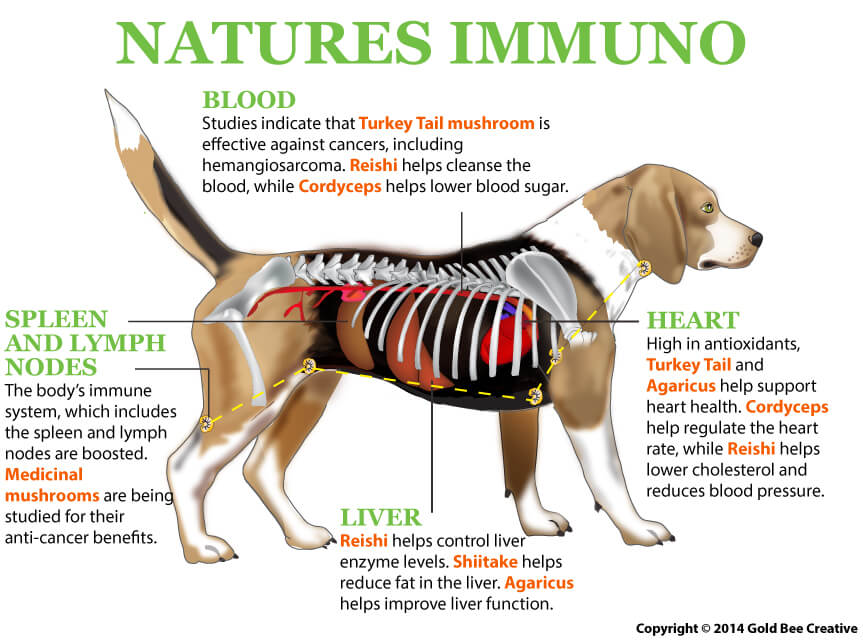
Turkey Tail mushroom is native to Asia, North America, and Europe. It has a long history of use in traditional herbalism and is currently being studied for its health benefits, including its value in fighting cancer. Research has shown that Turkey Tail is beneficial for many types of cancer as it contains properties that help fight cancer cells while helping to strengthen the immune system. Turkey tail mushroom for dogs has shown to be beneficial in spleen and liver hemangiosarcoma in dogs. It is also useful for heart health, lowering cholesterol, digestive issues, and skin problems.
Cordyceps mushroom is very rich in phytonutrients. Research has indicated that these mushrooms demonstrate anti-tumor, immune enhancing and hypoglycemic activity. It has anti-inflammatory, antioxidant, anti-tumor, anti-cancer, antimetastatic, and antiviral properties. It is very useful for diabetes as it helps lower blood sugar. Cordyceps also help enhance lymphocyte activity, which balance the immune system.
Reishi mushroom has been used for thousands of years in traditional Chinese medicine. It helps detoxify the blood, helps lower cholesterol and reduces blood pressure. It is also beneficial for the lymphatic system, which helps with a dog’s immunity.
Shiitake mushroom is a popular ingredient in cooking and is highly valued in traditional herbalism for its immune stimulating properties. It helps reduce fat in the liver, helps lower cholesterol, and is beneficial for heart health as it aids in reducing plaque in the arteries. Shiitake may help inhibit the growth of leukemia cells. Shiitake is also a good source of protein, vitamins, and minerals.
Agaricus mushroom is cultivated widely for dietary supplements and culinary purposes. Agaricus is useful for bone health, and helps with insulin production and helps with liver function. Agaricus is considered an adaptogen, which helps combat stress and supports the endocrine functions. This mushroom is currently used in Japan as an adjunctive with chemotherapy treatments.
Select your pet's weight to determine the correct dose.
To be taken twice daily.
Determine your pet’s weight and then use the easy chart below to determine the correct dose. You can safely double the recommended dosage.
Pet's Weight Dosage
0 - 15 lb 0.5 mL
16 - 30 lb 1.0 mL
31 - 45 lb 1.5 mL
46 - 60 lb 2.0 mL
61 - 75 lb 2.5 mL
Over 75 lb 3.0 mL
For small animals (rabbits, ferrets), avians and reptiles use 1 drop for every 2 lb of body weight.
How to Administer
Shake well before use. The easiest method is to use the dropper provided and place the drops into your pet’s food or favorite treat. You can also use the dropper and squirt directly into the pet’s mouth. Some pets can be finicky, if this occurs consider hiding the drops in foods most pet’s love such as fish, chicken, yogurt, or a favorite treat. If your pet only eats dry food then soak a few kibbles at feeding time.
For Best Results
Herbal dietary supplements are beneficial to the health and well-being of your pet and are safe for long-term use. Every pet responds to natural herbal supplements differently, therefore it is important to be consistent and administer the product daily. Supplements generally take two to four weeks to take effect, however this will vary from one animal to the next.
Product Storage
All NHV Natural Pet Products are pure herbal extracts and contain no artificial additives, preservatives or coloring. Shelf life after opening is 6 months and must be refrigerated after opening.
Natures Immuno is formulated for dogs from Turkey Tail, Cordyceps, Reishi, Shiitake, and Agaricus mushrooms by a holistic veterinarian and master herbalist. Medicinal mushrooms like these have been used for thousands of years in Chinese medicine as well as traditional herbalism. Researchers around the globe are now studying their potential in helping with cancer, balancing the immune system, and helping with digestive problems and more.
Natures Immuno Medicinal Mushroom blend for dogs also helps:
Medicinal mushrooms and mushroom extracts are used worldwide to help fight cancer and to help enhance and modulate the immune response of both people and animals. NHV’s mushroom blend contains 5 species of medicinal mushrooms for dogs, which have a long history of use, are well studied, and have been credited with having success against cancer as well as having antioxidant, hypocholesterolemia, anti-tumor, immunomodulatory, anti-allergic, nephroprotective, prebiotic, immunostimulant, anti-inflammatory, cardiovascular, and anti-diabetic properties
Properties of these Medicinal Mushrooms
Benefits of Natures Immuno Medicinal Mushrooms Blend for Dogs
You can read more about medicinal mushrooms for dogs and how they help give added support to pets for cancer and immunity.
NHV carries a wide range of holistic, natural vet-approved remedies that provide support along with a vet-recommended treatment plan. If you have questions about any of our plant-based supplements, ask an NHV expert, because, at NHV, we want your pet to live healthier and longer naturally.

Turkey Tail mushroom is native to Asia, North America, and Europe. It has a long history of use in traditional herbalism and is currently being studied for its health benefits, including its value in fighting cancer. Research has shown that Turkey Tail is beneficial for many types of cancer as it contains properties that help fight cancer cells while helping to strengthen the immune system. Turkey tail mushroom for dogs has shown to be beneficial in spleen and liver hemangiosarcoma in dogs. It is also useful for heart health, lowering cholesterol, digestive issues, and skin problems.
Cordyceps mushroom is very rich in phytonutrients. Research has indicated that these mushrooms demonstrate anti-tumor, immune enhancing and hypoglycemic activity. It has anti-inflammatory, antioxidant, anti-tumor, anti-cancer, antimetastatic, and antiviral properties. It is very useful for diabetes as it helps lower blood sugar. Cordyceps also help enhance lymphocyte activity, which balance the immune system.
Reishi mushroom has been used for thousands of years in traditional Chinese medicine. It helps detoxify the blood, helps lower cholesterol and reduces blood pressure. It is also beneficial for the lymphatic system, which helps with a dog’s immunity.
Shiitake mushroom is a popular ingredient in cooking and is highly valued in traditional herbalism for its immune stimulating properties. It helps reduce fat in the liver, helps lower cholesterol, and is beneficial for heart health as it aids in reducing plaque in the arteries. Shiitake may help inhibit the growth of leukemia cells. Shiitake is also a good source of protein, vitamins, and minerals.
Agaricus mushroom is cultivated widely for dietary supplements and culinary purposes. Agaricus is useful for bone health, and helps with insulin production and helps with liver function. Agaricus is considered an adaptogen, which helps combat stress and supports the endocrine functions. This mushroom is currently used in Japan as an adjunctive with chemotherapy treatments.
Select your pet's weight to determine the correct dose.
To be taken twice daily.
Determine your pet’s weight and then use the easy chart below to determine the correct dose. You can safely double the recommended dosage.
Pet's Weight Dosage
0 - 15 lb 0.5 mL
16 - 30 lb 1.0 mL
31 - 45 lb 1.5 mL
46 - 60 lb 2.0 mL
61 - 75 lb 2.5 mL
Over 75 lb 3.0 mL
For small animals (rabbits, ferrets), avians and reptiles use 1 drop for every 2 lb of body weight.
How to Administer
Shake well before use. The easiest method is to use the dropper provided and place the drops into your pet’s food or favorite treat. You can also use the dropper and squirt directly into the pet’s mouth. Some pets can be finicky, if this occurs consider hiding the drops in foods most pet’s love such as fish, chicken, yogurt, or a favorite treat. If your pet only eats dry food then soak a few kibbles at feeding time.
For Best Results
Herbal dietary supplements are beneficial to the health and well-being of your pet and are safe for long-term use. Every pet responds to natural herbal supplements differently, therefore it is important to be consistent and administer the product daily. Supplements generally take two to four weeks to take effect, however this will vary from one animal to the next.
Product Storage
All NHV Natural Pet Products are pure herbal extracts and contain no artificial additives, preservatives or coloring. Shelf life after opening is 6 months and must be refrigerated after opening.
discomfort support

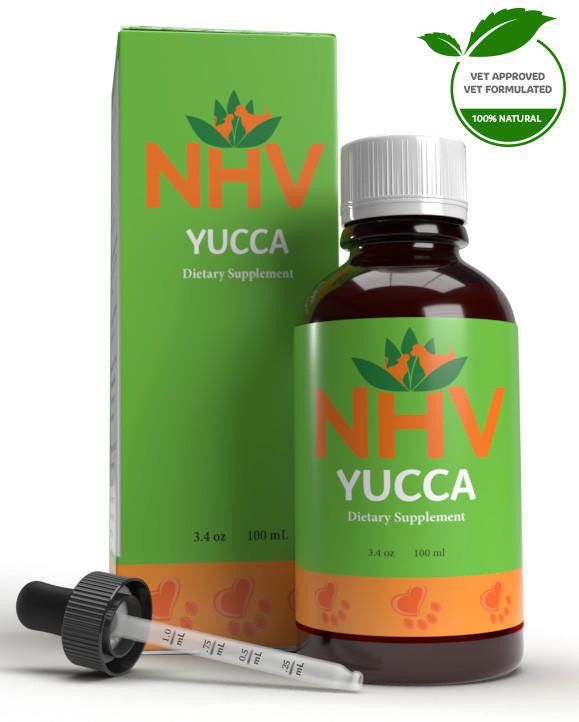
Support for Discomfort and Appetite Stimulant
buy 2 and save $3
3 month supply for a small to medium size
What is it?
NHV Yucca is used for cats as a supplement to provide nutrients, and may be helpful for discomfort, inflammation, and to increase or balance the appetite.
How does it work?
Why trust it?
NHV supplements are formulated by a veterinarian and master herbalist with a combined 50 years of experience.


What is it?
NHV Yucca is used for cats as a supplement to provide nutrients, and may be helpful for discomfort, inflammation, and to increase or balance the appetite.
How does it work?
Why trust it?
NHV supplements are formulated by a veterinarian and master herbalist with a combined 50 years of experience.

Yucca is used in cat food as well as food for other animals around the world. Its root is a highly nutritious herb that’s rich in vitamin C, beta-carotene, B vitamins, magnesium, iron, calcium, manganese, protein, niacin, and phosphorus.
Yucca contains two very beneficial compounds: sarsasapogenin and smilagenin. These two compounds work on the mucous membranes of the small intestine. These compounds help with the penetration and absorption of minerals and vitamins. Sarsasapogenin and smilagenin are known as steroidal saponins (phytosterols) which act as precursors to corticosteroids produced naturally by the body.
Steroidal saponins support the immune function of the body while stimulating and supporting the production of its own corticosteroids and corticosteroid–related hormones. Due to this action, studies conducted on Yucca have shown that it may be beneficial and effective for discomfort relief and inflammation in conditions such as arthritis. Yucca for cats may also be a natural appetite stimulant and may also help reduce the production of urease, which contributes to the unpleasant odors of urine and feces in some cats.
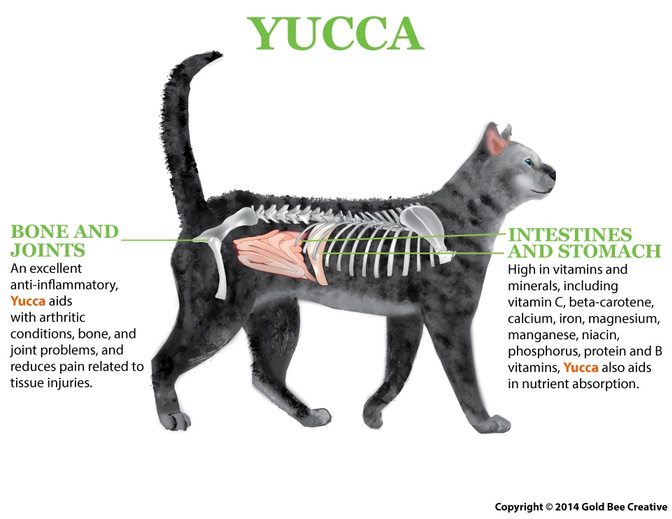
Yucca - Commonly used for supporting arthritis, as an anti-inflammatory, nutritive, antitumor, and digestive supplement.

Select your pet's weight to determine the correct dose.
To be taken twice daily. Determine your pet’s weight and then use the easy chart below to determine the correct dose. This is the minimum dosage.
Pet's Weight Dosage
0 - 15 lb = 0.5 ml
16 - 30 lb = 1.0 ml
31 - 45 lb = 1.5 ml
46 - 60 lb = 2.0 ml
61 - 75 lb = 2.5 ml
Over 75 lb = 3.0 ml
How to Administer: Shake well before use. The easiest method is to use the dropper provided and place the drops into your pet’s food or favorite treat. You can also use the dropper and squirt directly into the pet’s mouth. Some pets can be finicky, if this occurs consider hiding the drops in foods most pet’s love such as fish, chicken, yogurt, or a favorite treat. If your pet only eats dry food then soak a few kibbles at feeding time.
For Best Results: Herbal dietary supplements are beneficial to the health and well-being of your pet and are safe for long-term use. Every pet responds to natural herbal supplements differently, therefore it is important to be consistent and administer the product daily. Supplements generally take two to four weeks to take effect, however this will vary from one animal to the next.
Product Storage:
All NHV Natural Pet Products are pure herbal extracts and contain no artificial additives, preservatives or coloring. Shelf life after opening is 6 months and must be refrigerated after opening.
Cautions and Contraindications
Do not use Yucca in pregnant or nursing animals.
Speak to your vet before using our products. A second visit is recommended if your pet’s condition does not improve, or deteriorates after continued use of the supplements. All information provided by NHV Natural Pet Products is for educational purposes only.
Yucca is used in cat food as well as food for other animals around the world. Its root is a highly nutritious herb that’s rich in vitamin C, beta-carotene, B vitamins, magnesium, iron, calcium, manganese, protein, niacin, and phosphorus.
Yucca contains two very beneficial compounds: sarsasapogenin and smilagenin. These two compounds work on the mucous membranes of the small intestine. These compounds help with the penetration and absorption of minerals and vitamins. Sarsasapogenin and smilagenin are known as steroidal saponins (phytosterols) which act as precursors to corticosteroids produced naturally by the body.
Steroidal saponins support the immune function of the body while stimulating and supporting the production of its own corticosteroids and corticosteroid–related hormones. Due to this action, studies conducted on Yucca have shown that it may be beneficial and effective for discomfort relief and inflammation in conditions such as arthritis. Yucca for cats may also be a natural appetite stimulant and may also help reduce the production of urease, which contributes to the unpleasant odors of urine and feces in some cats.

Yucca - Commonly used for supporting arthritis, as an anti-inflammatory, nutritive, antitumor, and digestive supplement.

Select your pet's weight to determine the correct dose.
To be taken twice daily. Determine your pet’s weight and then use the easy chart below to determine the correct dose. This is the minimum dosage.
Pet's Weight Dosage
0 - 15 lb = 0.5 ml
16 - 30 lb = 1.0 ml
31 - 45 lb = 1.5 ml
46 - 60 lb = 2.0 ml
61 - 75 lb = 2.5 ml
Over 75 lb = 3.0 ml
How to Administer: Shake well before use. The easiest method is to use the dropper provided and place the drops into your pet’s food or favorite treat. You can also use the dropper and squirt directly into the pet’s mouth. Some pets can be finicky, if this occurs consider hiding the drops in foods most pet’s love such as fish, chicken, yogurt, or a favorite treat. If your pet only eats dry food then soak a few kibbles at feeding time.
For Best Results: Herbal dietary supplements are beneficial to the health and well-being of your pet and are safe for long-term use. Every pet responds to natural herbal supplements differently, therefore it is important to be consistent and administer the product daily. Supplements generally take two to four weeks to take effect, however this will vary from one animal to the next.
Product Storage:
All NHV Natural Pet Products are pure herbal extracts and contain no artificial additives, preservatives or coloring. Shelf life after opening is 6 months and must be refrigerated after opening.
Cautions and Contraindications
Do not use Yucca in pregnant or nursing animals.
Speak to your vet before using our products. A second visit is recommended if your pet’s condition does not improve, or deteriorates after continued use of the supplements. All information provided by NHV Natural Pet Products is for educational purposes only.
parasite support
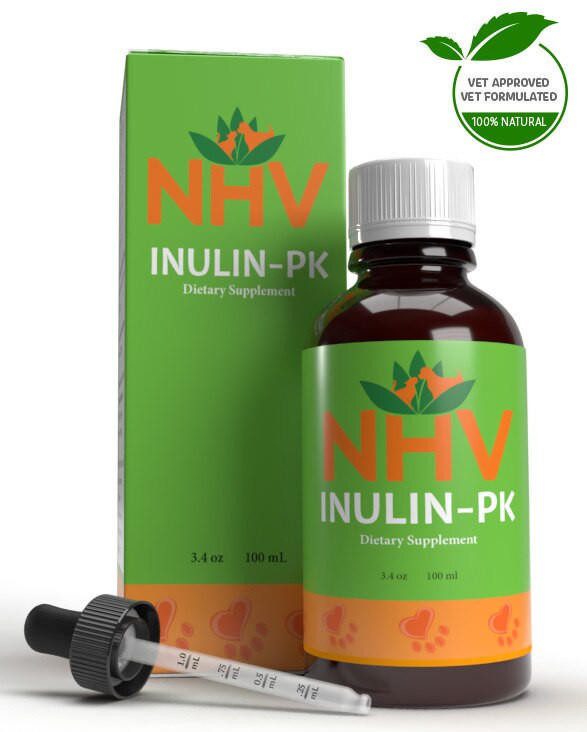
Natural Dog Worms Remedy and Dewormer
buy 2 and save $3
3 month supply for a small to medium size pet
What is it?
Inulin-PK works as a natural dog worm and parasite herbal support. Proactively address parasitic infections and help your hound heal with a holistic dog dewormer remedy from NHV.
How does it work?
Why trust it?
NHV is vet-formulated with human-grade ingredients.

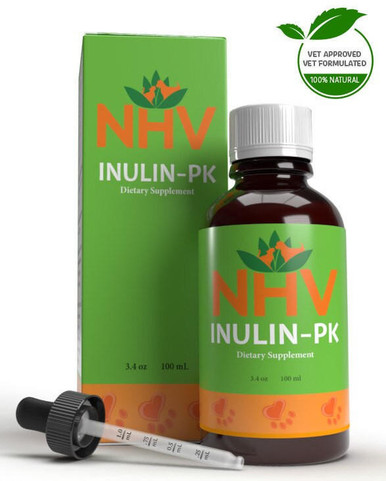
What is it?
Inulin-PK works as a natural dog worm and parasite herbal support. Proactively address parasitic infections and help your hound heal with a holistic dog dewormer remedy from NHV.
How does it work?
Why trust it?
NHV is vet-formulated with human-grade ingredients.

Parasites aren’t just annoying pests plaguing your pet. Left to their own devices, parasites can lead to serious health issues. They make it harder for dogs to absorb nutrients from their food, damage their intestines, and sap your pup’s energy. You might also see weight loss, anemia, or diarrhea in a pet with parasites.
Roundworms, tapeworms, hookworms, whipworms, and threadworms are all types of parasites that Inulin-PK can help expel from your pet’s body naturally. Consider this natural dewormer for dogs in addition to the treatment prescribed by your vet. Natural dog dewormer remedies like Inulin-PK can also help improve your pet’s immunity to prevent future infections.
Inulin-PK is a powerful natural dewormer for dogs and infection-fighting aid. It contains plant extracts that specifically target canine parasites.
Our dog worm remedy is formulated with ingredients like elecampane that paralyzes worms’ central nervous system, Papaya to help dissolve worms’ outer layers, Bacopa with strong anti-inflammatory properties, and Jamaica Quassia to help flush parasites out of your dog’s body.
For additional comprehensive care, see our collection of effective kits containing natural dog deworming remedies.
NHV makes significant annual investments in clinical research to make sure our natural pet products are supported by recent clinical results. For more information on what NHV is doing to ensure quality solutions for your pet’s health issues, call our pet expert hotline at 1-877-937-4372.
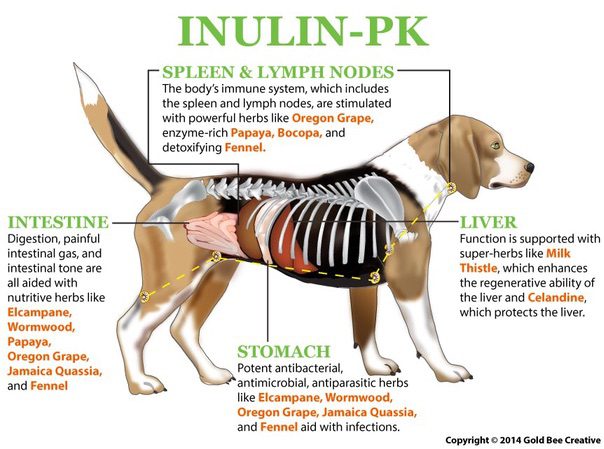
Elecampane – Paralyzes the central nervous systems of worms
Wormwood – Eliminates intestinal worms and fights parasitic infestations
Jamaica Quassia – Eliminates parasitic worms from the body
Papaya – Dissolves the worm’s outer layer and weakens its defenses
Oregon Grape – Contains antibiotic and immunostimulatory properties, relieves indigestion, and improves nutrient absorption
Fennel – Decreases digestive problems and calms spasms
Bacopa – Contains anti-inflammatory properties, eliminates toxins, and promotes healing
Milk Thistle – Protects and strengthens liver function and stimulates new cell growth in the liver
Celandine – Protects the liver, improves the flow of bile to the liver, and emulsifies gallbladder content
Select your pet's weight to determine the correct dose.
To be taken twice daily. Determine your pet’s weight and then use the easy chart below to determine the correct dose. This is the minimum dosage.
Pet's Weight Dosage
0 - 15 lb = 0.5 ml
16 - 30 lb = 1.0 ml
31 - 45 lb = 1.5 ml
46 - 60 lb = 2.0 ml
61 - 75 lb = 2.5 ml
Over 75 lb = 3.0 ml
For small animals (rabbits, ferrets), avians and reptiles use 1 drop for every 2 lb of body weight.
How to Administer
Shake well before use.
The easiest method is to use the dropper provide and places the drops into your pet’s food or favorite treat. You can also use the dropper and squirt directly into the pet’s mouth.
Some pets can be finicky, if this occurs consider hiding the drops in foods most pet’s love such as fish, chicken or yogurt or a favourite treat. If your pet only eats dry food then soak a few kibbles at feeding time.
For Best Results
Herbal dietary supplements are beneficial to the health and wellbeing of your pet and are safe for long-term use. Every pet responds to natural herbal supplements differently, therefore it is important to be consistent and administer the product daily. Supplements generally take two to four weeks to take effect, however this will vary from one animal to the next.
Product Storage
All NHV Natural Pet Products are pure herbal extracts and contain no artificial additives, preservatives or coloring. Shelf life after opening is 6 months and must be refrigerated after opening.
Cautions and Contraindications
Do not use Inulin-PK in pregnant animals.
Speak to your vet before using our products. A second visit is recommended if your pet’s condition does not improve, or deteriorates after continued use of the supplements.
All information provided by NHV Natural Pet Products is for educational purposes only.
Parasites aren’t just annoying pests plaguing your pet. Left to their own devices, parasites can lead to serious health issues. They make it harder for dogs to absorb nutrients from their food, damage their intestines, and sap your pup’s energy. You might also see weight loss, anemia, or diarrhea in a pet with parasites.
Roundworms, tapeworms, hookworms, whipworms, and threadworms are all types of parasites that Inulin-PK can help expel from your pet’s body naturally. Consider this natural dewormer for dogs in addition to the treatment prescribed by your vet. Natural dog dewormer remedies like Inulin-PK can also help improve your pet’s immunity to prevent future infections.
Inulin-PK is a powerful natural dewormer for dogs and infection-fighting aid. It contains plant extracts that specifically target canine parasites.
Our dog worm remedy is formulated with ingredients like elecampane that paralyzes worms’ central nervous system, Papaya to help dissolve worms’ outer layers, Bacopa with strong anti-inflammatory properties, and Jamaica Quassia to help flush parasites out of your dog’s body.
For additional comprehensive care, see our collection of effective kits containing natural dog deworming remedies.
NHV makes significant annual investments in clinical research to make sure our natural pet products are supported by recent clinical results. For more information on what NHV is doing to ensure quality solutions for your pet’s health issues, call our pet expert hotline at 1-877-937-4372.

Elecampane – Paralyzes the central nervous systems of worms
Wormwood – Eliminates intestinal worms and fights parasitic infestations
Jamaica Quassia – Eliminates parasitic worms from the body
Papaya – Dissolves the worm’s outer layer and weakens its defenses
Oregon Grape – Contains antibiotic and immunostimulatory properties, relieves indigestion, and improves nutrient absorption
Fennel – Decreases digestive problems and calms spasms
Bacopa – Contains anti-inflammatory properties, eliminates toxins, and promotes healing
Milk Thistle – Protects and strengthens liver function and stimulates new cell growth in the liver
Celandine – Protects the liver, improves the flow of bile to the liver, and emulsifies gallbladder content
Select your pet's weight to determine the correct dose.
To be taken twice daily. Determine your pet’s weight and then use the easy chart below to determine the correct dose. This is the minimum dosage.
Pet's Weight Dosage
0 - 15 lb = 0.5 ml
16 - 30 lb = 1.0 ml
31 - 45 lb = 1.5 ml
46 - 60 lb = 2.0 ml
61 - 75 lb = 2.5 ml
Over 75 lb = 3.0 ml
For small animals (rabbits, ferrets), avians and reptiles use 1 drop for every 2 lb of body weight.
How to Administer
Shake well before use.
The easiest method is to use the dropper provide and places the drops into your pet’s food or favorite treat. You can also use the dropper and squirt directly into the pet’s mouth.
Some pets can be finicky, if this occurs consider hiding the drops in foods most pet’s love such as fish, chicken or yogurt or a favourite treat. If your pet only eats dry food then soak a few kibbles at feeding time.
For Best Results
Herbal dietary supplements are beneficial to the health and wellbeing of your pet and are safe for long-term use. Every pet responds to natural herbal supplements differently, therefore it is important to be consistent and administer the product daily. Supplements generally take two to four weeks to take effect, however this will vary from one animal to the next.
Product Storage
All NHV Natural Pet Products are pure herbal extracts and contain no artificial additives, preservatives or coloring. Shelf life after opening is 6 months and must be refrigerated after opening.
Cautions and Contraindications
Do not use Inulin-PK in pregnant animals.
Speak to your vet before using our products. A second visit is recommended if your pet’s condition does not improve, or deteriorates after continued use of the supplements.
All information provided by NHV Natural Pet Products is for educational purposes only.
Published: September 12, 2022